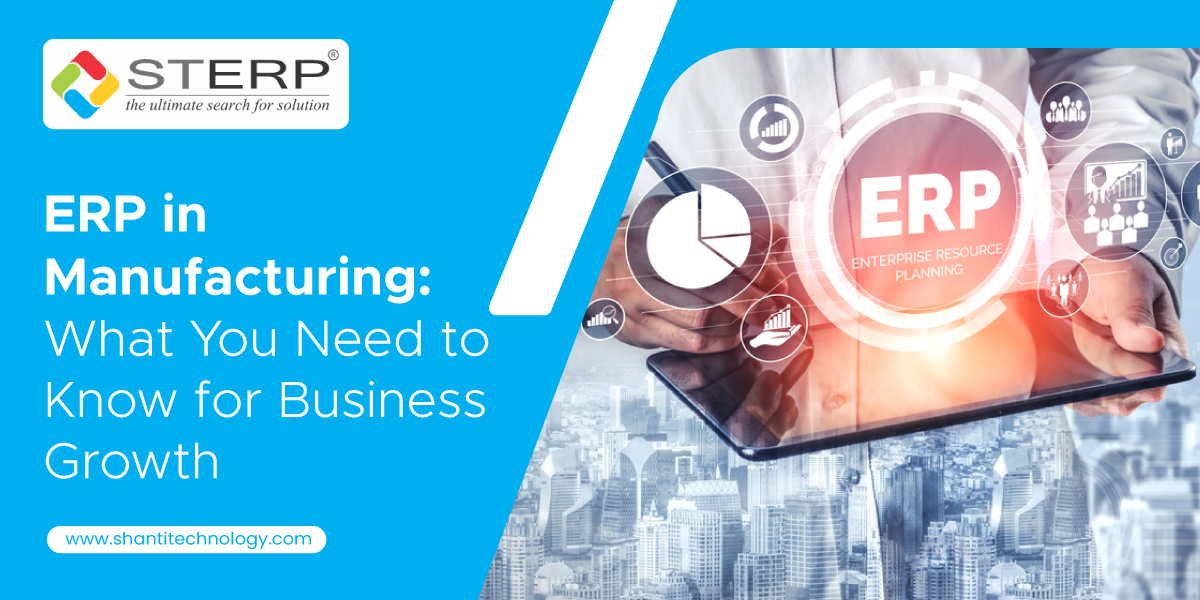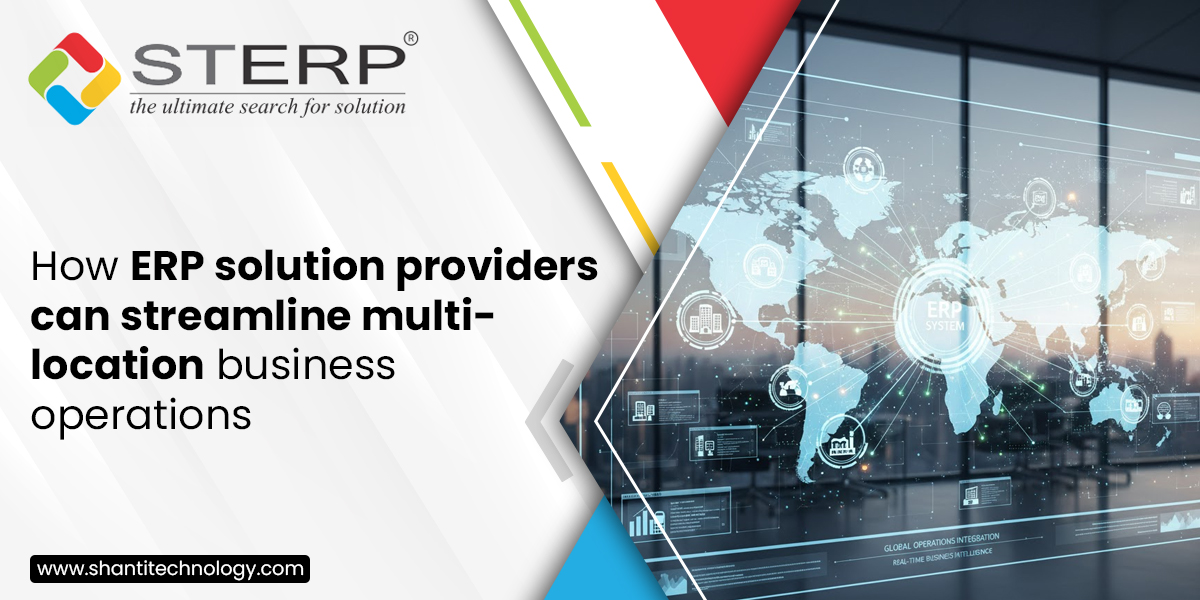
In today’s highly competitive industrial environment, characterised by the paramount importance of efficiency, precision, and adaptability, manufacturing enterprises are consistently in pursuit of cutting-edge instruments to optimise their processes. Enterprise Resource Planning (ERP) systems are a pivotal technological advancement that is transforming the operational landscape of manufacturing organisations, enabling them to efficiently manage resources and attain long-term success. At STERP (Shanti Technology), we possess a profound comprehension of the fundamental significance of ERP systems for manufacturing companies in facilitating achievements for manufacturing enterprises. In this all-encompassing manual, we extensively explore the essential components of ERP systems specifically designed to cater to the manufacturing sector.
Understanding ERP Systems for Manufacturing Companies:
The field of manufacturing encompasses multifaceted aspects, including detailed operational procedures, complexities within the supply chain, effective inventory management, and rigorous quality control measures. ERP for manufacturing companies plays a crucial role in the manufacturing industry by serving as a comprehensive solution that consolidates and integrates diverse processes and departments inside a single digital framework. An Enterprise Resource Planning (ERP) system facilitates efficient coordination and communication inside an organisation, encompassing many functions such as production planning, scheduling, procurement, inventory management, and quality control.
The Impact of ERP for Manufacturing Companies:
The implementation of ERP software for manufacturing companies has the potential to significantly impact manufacturing firms. The automation of regular tasks, real-time data insights, and support for informed decision-making contribute to the enhancement of operational efficiency. Furthermore, by offering a comprehensive perspective of the complete production process, enterprise resource planning (ERP) systems enable firms to detect areas of congestion, streamline workflows, and augment efficiency.
Tailored ERP Solutions for the Manufacturing Sector:
At STERP, our area of expertise lies in the development of Enterprise Resource Planning (ERP) software that is specifically designed to meet the unique requirements of manufacturing organisations. The ERP systems we have developed are specifically tailored to effectively tackle the distinct difficulties encountered within the business, encompassing:
â—Production Planning and Scheduling:
The effective management of production schedules, resource allocation, and punctual deliveries is of utmost importance in production planning and scheduling. The ERP systems for manufacturing companies developed by STERP focus on streamlining production planning, optimising schedules, and allocating resources to boost productivity.
â—Inventory Management:
Inventory management involves the careful maintenance of ideal inventory levels, ensuring that neither excessive stock nor shortages occur. The Enterprise Resource Planning (ERP) software designed for manufacturing organisations provides accurate inventory management capabilities, thereby reducing carrying costs and assuring optimal stock availability.
â—Quality Control:
Maintaining strict adherence to rigorous quality standards is an imperative aspect of the production process that cannot be compromised. The ERP for software development company developed by STERP integrates comprehensive quality control modules, facilitating the continuous monitoring of operations, and adherence to established quality standards.
â—Supply Chain Optimization:
Supply chain optimisation is crucial for the efficient functioning of manufacturing operations. The ERP systems provided by our company enable efficient integration throughout the supply chain, from procurement to distribution processes. This integration promotes streamlined operations and reduces the occurrence of disruptions.
Challenges in Manufacturing Operations:
Manufacturing operations frequently encounter a multitude of inefficiencies and barriers that are inherent in conventional management methods. The identification of these difficulties is of utmost importance in order to implement solutions that are successful and enhance overall efficiency.
- Legacy Systems and Siloed Data: Numerous manufacturing enterprises heavily depend on antiquated legacy technologies that function within isolated data environments. The presence of fragmentation results in a fragmented data flow, which poses difficulties in achieving a comprehensive understanding of operational processes. Consequently, the decision-making processes experience hindrances, leading to the persistence of inefficiencies.
- Inadequate Inventory Management: Deficient inventory management procedures, such as imprecise demand forecasting or excessive stock levels, can lead to heightened carrying expenses, instances of stockouts, or production delays. The persistence of inventory-related difficulties is attributed to the absence of real-time visibility and management.
- Lack of Integration Across Processes: One of the key challenges in manufacturing is the absence of integration across several interdependent processes. When the integration of these processes is not executed cohesively, it results in the occurrence of communication gaps, bottlenecks, and delays. The absence of integration has a detrimental impact on production schedules and the overall efficiency of operations.
- Quality Control Issues: Quality control is of utmost importance in the manufacturing industry as it is crucial to ensure the maintenance of constant product quality. Nevertheless, in the absence of adequate quality control protocols and continuous monitoring, the occurrence of faults or deviations frequently undermines the integrity of products and diminishes customer satisfaction.
Implementation Strategies and Best Practices:
ERP software for manufacturing companies necessitates meticulous strategic planning, precise execution, and strict adherence to established industry standards and guidelines. The following factors should be taken into account to achieve a seamless implementation of an Enterprise Resource Planning (ERP) system:
- Thorough Needs Assessment: A detailed needs assessment should be conducted before the implementation of an Enterprise Resource Planning (ERP) system. To properly align the ERP solution, it is crucial to comprehend the precise requirements, pain points, and objectives associated with the manufacturing processes.
- Engage Stakeholders: Facilitate the participation of essential stakeholders from diverse departments in the process of implementation. The contributions and collaborative efforts of individuals are crucial in ensuring a smooth and effective process of transitioning. Effective communication of the advantages and modifications is vital in order to secure their support and agreement.
- Data Migration and Integration: The objective is to guarantee a smooth transition of data from current systems to the new Enterprise Resource Planning (ERP) system through effective data migration and integration processes. The effective integration of data across many departments is of utmost importance in order to prevent the formation of data silos and facilitate precise reporting and decision-making processes.
- Customization vs. Standardization: The present analysis aims to assess the necessity of customising the Enterprise Resource Planning (ERP) system in order to align it with the specific requirements of a firm. While the process of customisation has the potential to cater to specific requirements, it is important to note that an excessive amount of modifications might lead to complications in terms of future updates and maintenance.
- Training and Change Management: It is recommended to allocate resources towards the implementation of comprehensive training programmes aimed at equipping staff with the necessary knowledge and skills to effectively adapt to and utilise the new Enterprise Resource Planning (ERP) system. Furthermore, the implementation of efficient change management strategies facilitates the seamless adjustment of staff to novel procedures and technology.
- Testing and Continuous Improvement: It is imperative to engage in thorough testing of the Enterprise Resource Planning (ERP) system before its implementation in order to detect and rectify any potential difficulties that may arise. After the implementation phase, it is essential to build procedures that provide continual improvement and provide support to optimise the usage of the system and answer evolving needs.
Manufacturing businesses can effectively employ enterprise resource planning (ERP) systems to simplify operations, enhance efficiency, and attain sustainable growth in the current competitive environment by properly tackling these difficulties and adhering to established best practices.
Why Choose STERP's ERP Software for Manufacturing Companies?
- Customization: We understand that each manufacturing business has unique requirements. Our ERP solutions are highly customizable, catering specifically to individual business needs.
- Scalability: As your manufacturing enterprise grows, so do your requirements. STERP's ERP systems are scalable, ensuring they adapt and expand alongside your business.
- User-Friendly Interface: Our ERP software boasts an intuitive user interface, ensuring ease of use and minimal training requirements for your staff.
- Data Security: We prioritize the security of your sensitive business data. Our ERP systems employ robust security measures to safeguard your information.
Future Trends in ERP for Manufacturing:
The domain of enterprise resource planning (ERP) in the manufacturing sector is in a constant state of evolution, as it integrates advanced technology to improve operational efficiency and maintain a competitive advantage. Several emergent themes can be identified, namely:
- Internet of Things (IoT) Integration: The integration of IoT involves the establishment of connections between machines and devices in order to collect real-time data. This data is then utilised for predictive maintenance, resource optimisation, and process automation.
- Artificial Intelligence (AI) and Machine Learning (ML): The utilisation of AI and ML involves the application of algorithms to examine extensive datasets, make predictions about patterns, and enhance the efficiency of production processes.
- Cloud-Based ERP Solutions: Cloud-based Enterprise Resource Planning (ERP) solutions are increasingly preferred by industrial organisations due to their enhanced flexibility, scalability, and accessibility.
Final Thoughts:
The adoption of a manufacturing-specific ERP system has transitioned from being a discretionary choice to becoming an essential requirement for achieving long-term growth and maintaining a competitive edge. At STERP, our primary objective is to facilitate and enhance manufacturing proficiency by offering state-of-the-art Enterprise Resource Planning (ERP) solutions. The wide range of features offered in our comprehensive suite addresses the varied requirements of the manufacturing industry, resulting in smooth operations, increased efficiency, and expedited business expansion.
Are you prepared to enhance operational efficiency and achieve unprecedented levels of success in your manufacturing enterprise? Discover STERP's cutting-edge ERP for software development company as well as ERP software for manufacturing companies and commence a transformative endeavour towards achieving operational excellence in the industrial sector.
Contact us to schedule a consultation and witness the transformative power of ERP in revolutionizing your manufacturing operations. Gain a competitive edge in the dynamic landscape of the engineering industry with STERP – Your Partner in Manufacturing Excellence.
Recent Blogs

Top 5 Reasons for using ERP as a Project Management Software
Any business, no matter how big or little, may gain a great.....
More Info
How ERP Solution Providers Can Streamline Multi-Location Business Operations
Running a business with multiple branches, warehouses, or manufacturing units is a challenge that re.....
More Info
Industries that can benefit the most from an ERP System
STERP (Shanti Technology) is one of the most preferred ERP software companies in Madhya Pradesh that.....
More Info
Which one is better, On-Site ERP or Cloud ERP?
STERP (Shanti Technology) offers the most efficient ERP software for engineering companies in Rajkot.....
More Info
Why should you Upgrade your ERP system?
Businesses frequently become preoccupied with striving to increase profits and lose sight of the fac.....
More Info